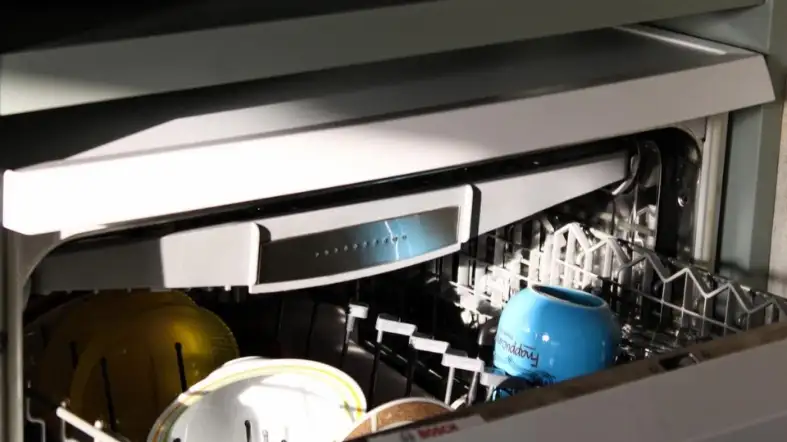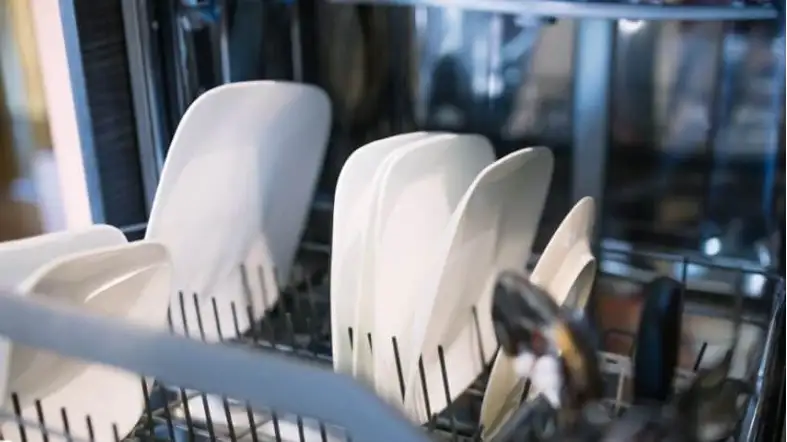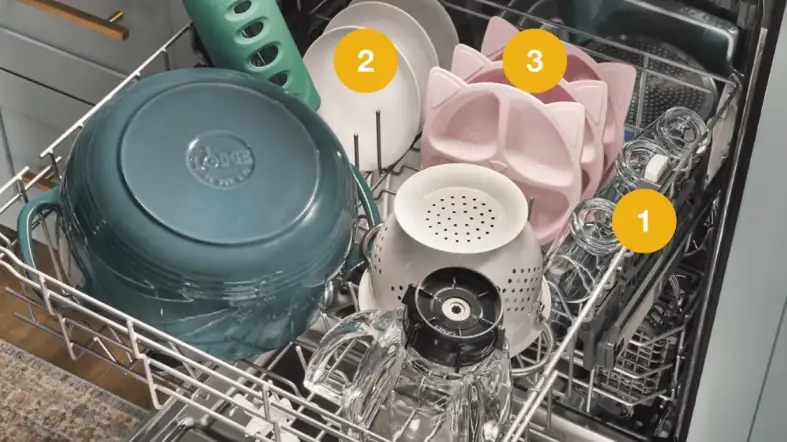Is your Bosch dishwasher leaving you with half-finished cycles and a sink full of frustration? Discover the real reasons why your dishwasher might not be completing cycles.
This article identifies the key culprits in dishwashing problems, including clogged drains and broken heating elements.
With Bosch dishwashers, you won’t have to worry about interruptions.

Common Culprits Behind Bosch Dishwasher Cycle Interruptions
Clogged or Kinked Drain Lines
Clogged or kinked drain lines are common causes of Bosch dishwasher interruptions. After each wash, these drain lines play a crucial role in disposing of dirty water.
Getting these lines clogged or kinked can trigger an error code that causes the cycle to pause. Preventing such interruptions requires maintaining clear, unobstructed drain lines.
Defective Heating Element
Increasing the wash water temperature in a dishwasher is essential for effective cleaning. Defects in this element can prevent the dishwasher from reaching the desired temperature.
As a result, the cycle may be interrupted, leading to incomplete cleaning. In order to complete the cycle, it is vital to monitor the performance of the heating element.
Circulation Pump/Motor Malfunction
The circulation pump and motor are integral to the proper functioning of your Bosch dishwasher. They work together to ensure that water is evenly distributed during the wash cycle.
When these components become defective or malfunction, they can disrupt the smooth flow of water. During this disruption, certain parts of the dishwasher may not receive adequate water, stalling the cycle.
Regular maintenance and checking for any signs of malfunction can help prevent this issue.
Control Board Failure
Imagine the control board of your dishwasher as its central command center. It interprets signals, controls processes, and ensures the cycle runs smoothly.
A faulty control board can misinterpret signals, leading to the cycle being paused unexpectedly.
This interruption can occur due to an erroneous error code or a misdiagnosis. The best way to diagnose and resolve a control board issue is to consult a technician.
Power Supply Disruption
An interruption in the power supply can have a significant impact on your Bosch dishwasher.
Power outages or fluctuations can pause the cycle and even corrupt the control board’s memory. Such disruptions are often unforeseen and can cause inconvenience.
When the power supply stabilizes, the control board must be reset to restore normal operation.
Loose Door Latch
During cycles, your dishwasher’s door latch ensures the door is properly sealed. If the latch becomes loose, misaligned, or faulty, it can trigger the door safety switch.
This switch, when activated, leads to the cycle being paused as a safety measure. Maintaining the door latch’s integrity can prevent unnecessary interruptions in dishwasher cycles.
Troubleshooting Steps to Restore Completion of Bosch Dishwasher Cycles

Reset the Controls
Resetting the controls is a simple yet effective troubleshooting step. When your Bosch dishwasher cycle stalls, it might be due to minor glitches.
Unplug the dishwasher for 5 minutes in order to reset its controls. Afterward, plug it back in and press and hold the Start/Reset button for 5 seconds.
This action clears temporary issues, often allowing the cycle to continue smoothly.
Check the Door Seal
A misaligned or damaged door seal can lead to incomplete cycles in your Bosch dishwasher. Ensure that your door seals are aligned on a regular basis to solve this problem.
Ensure it fits snugly and creates a proper seal when the door is closed. Make sure your door seal is properly aligned and repaired if you notice any damage or misalignment.
Check the Filter
Over time, the dishwasher filter can become clogged with food particles and debris. This accumulation can hinder proper drainage, causing the cycle to pause.
Remove the dishwasher filter and rinse it under running water to resolve this issue. Regularly cleaning the filter helps maintain efficient water flow and prevents interruptions.
Check the Float Switch
The float switch acts as a safety mechanism to prevent flooding in the dishwasher. If the float switch becomes dirty or malfunctions, it might erroneously halt the cycle.
Remove the dishwasher’s float switch and rinse it under running water to resolve this issue.
The float switch should be clean and in good working order to prevent unwarranted delays.
Check the Water Inlet Valve
The dishwasher cannot fill with water if the water inlet valve is malfunctioning. If there are any leaks, turn on the water supply to the dishwasher and observe them.
Leaks can indicate an issue with the valve. You may need to replace the water inlet valve if it appears that there is a problem.
Check the Heating Element
Getting the right temperature for dishwasher cleaning depends on the heating element. If the heating element is not functioning, it can impact the cycle’s completion.
Feel the heat coming from the dishwasher after it has been turned on. If the element is not generating heat, consider replacing it to ensure dishes are properly sanitized.
Factors Affecting Bosch Dishwasher Cycle Completion

Hard Water and Mineral Buildup
Hard water and mineral buildup can impact your Bosch dishwasher’s performance over time. Despite being designed for hard water, these dishwashers can accumulate mineral deposits.
This accumulation can lead to longer cycle times or incomplete cycles. Deposits on the heating element, spray arms, and filters reduce efficiency and cleaning results.
Use water softeners or special salts to prevent mineral buildup to counteract this.
High Soil Loads
Overloading your dishwasher with heavily soiled dishes can hinder proper cycle completion. Excessive food residue can overload filters and obstruct spray arm rotation.
This forces the dishwasher to work harder and longer, potentially causing motor overheating or stalling.
When washing heavily soiled dishes, use appropriate cycles and detergents to prevent this.
Ventilation and Clearances
Proper ventilation and clearances are essential for your Bosch dishwasher’s functioning. Adequate ventilation allows moisture to escape during the drying cycle.
Inadequate ventilation can trap moisture and lead to errors or malfunctions disrupting the cycle. To ensure optimal performance, maintain at least 2 inches of clearance on all sides of the dishwasher.
Also, verify that the door seal remains undamaged and unobstructed.
Use of Wrong Detergents
Using incorrect detergents can lead to sudsing and clogging, preventing cycle completion. Bosch dishwashers require specific detergent types.
Wrong detergents can compromise components and disrupt the cycle. Always use detergents recommended by Bosch to avoid sudsing-related issues.
Installation Issues
Proper installation is crucial for your dishwasher’s performance. If the dishwasher is not level or connections are loose, it may malfunction.
Ensuring proper anchoring to the cabinet is also vital. Inadequate installation can lead to improper functioning, disrupting cycle completion.
Verify that your dishwasher is installed correctly to prevent such issues.
Preventive Maintenance for Uninterrupted Bosch Dishwasher Cycles

Tips for Long-Lasting Performance
The average dishwasher lifespan is around 10 years, according to the National Association of Home Builders.
Brand, model, usage frequency, and maintenance practices all affect dishwasher longevity.
With proper care, Bosch dishwashers can often last up to 12 years because of their high quality and durability.
Regular Cleaning for Optimal Performance
Regular cleaning is crucial for maintaining the efficiency of your Bosch dishwasher.
Dishwasher interiors accumulate food bits, grease, undissolved detergent, and minerals over time, particularly in the filter.
As a result, dishwashers may operate slower or fail to complete cycles effectively.
Here are the steps to ensure your Bosch dishwasher remains in top shape:
Bosch Dishwasher Cleaner:
Using the Bosch dishwasher cleaner a few times a year can help remove greasy residues and buildup.
Add one box of the cleaner to the bottom of your dishwasher, then run the hottest and longest cycle. Dishwashers with this process are kept free from residues that can affect their performance.
Bosch Descaler:
Hard water deposits and limescale buildup can be problematic for dishwashers. Using the Bosch descaler a few times a year can help combat these deposits.
Add one box of descaler to the bottom of the dishwasher and run the hottest and longest cycle. This process helps maintain the efficiency of your dishwasher’s components.
Regular Filter Cleaning:
The filter of your dishwasher, usually located at the bottom, can also accumulate debris over time.
Consult your owner’s manual for guidance on how to remove it. Rinse the filter with water and clean it with a soft brush and soap after removing it.
This step helps prevent clogs and ensures that water can flow through the dishwasher properly.
Check Spray Arms:
Ensure that the spray arms are free from any blockages and are clean. Running them underwater is an easy way to identify any blocked holes.
If you find blockages, use a toothpick to loosen any debris that might be caught in the holes. This step ensures that water can be distributed effectively during cycles.
Exterior Care:
Clean your dishwasher’s exterior with a damp cloth and mild soap to keep it looking and working its best. Wipe stainless steel models in the direction of the grain and use
Bosch stainless steel conditioner. This helps maintain the dishwasher’s appearance over time.
Proper Installation and Operation

Overloading and Pre-Rinsing:
Preventing debris accumulation is key to uninterrupted cycles. Pre-rinse dishes before placing them into the dishwasher to avoid overloading the dishwasher.
In overloaded dishwashers, spray arms may not reach all dishes, accumulating food.
Ventilation and Detergents:
Proper ventilation is crucial for the optimal performance of Bosch dishwashers. Limited ventilation may cause moisture to build up in the dishwasher, affecting the cycle’s completion.
Make sure to use recommended detergents to prevent excessive sudsing. Suds can lead to complications, including sensor malfunctions and reduced cleaning effectiveness.
Mounting and Anchoring:
To minimize vibration-related issues, make sure your dishwasher is securely mounted and anchored. Vibrations can lead to noise, wear and tear, and loosening of parts.
Proper mounting and anchoring help maintain the dishwasher’s stability during operation.
Door Seals and Latches:
Maintain door seals and latches to ensure they fit tightly and are in good condition.
Deficiencies in seals and latches can cause water leakage, affecting the dishwasher’s performance.
Additional Preventive Maintenance Tips
Descaling:
Using vinegar or citric acid, you can periodically descal your water to prevent mineral buildup.
Cleaning the dishwasher’s components with vinegar or citric acid can help remove mineral deposits.
Proper Loading and Pre-Rinsing:
To prevent debris accumulation, avoid overloading your dishwasher.
Also, consider pre-rinsing dishes to remove large food particles before placing them in the dishwasher. This practice helps maintain the dishwasher’s efficiency.
Ventilation Clearance:
Proper ventilation is vital for effective drying. Make sure your dishwasher has sufficient clearance to ensure adequate air circulation.
This step prevents the buildup of moisture inside the dishwasher, which can impact cycle completion.
Recommended Detergents:
Using the correct detergents is essential to prevent issues related to sudsing. Bosch dishwashers are designed to work with specific detergent types.
Using the recommended detergent prevents excessive suds from disrupting the dishwasher.
Secure Mounting:
Ensure your dishwasher is properly mounted and anchored to minimize vibrations. Components can become loose during operation, disrupting the cycle if not secured.
Door Seals and Latches Inspection:
Check and align door seals and latches regularly to ensure they are providing a tight seal.
Seals and latches that are damaged or misaligned can leak water, affecting dishwasher performance.
FAQs About Bosch Dishwasher Cycle Completion Issues
Can Clogged Drain Lines And Pumps Cause A Bosch Dishwasher Cycle To Stall?
Yes, clogged drain lines and pumps can cause a Bosch dishwasher cycle to stall.
When the drain lines or pump is blocked, an error code is triggered, which pauses the cycle.
In order for the cycle to continue, the obstruction must be removed from the lines or pump.
Does Low Rinse Aid Cause Bosch Dishwasher Cycles To Stop Prematurely?
No, the Low rinse aid does not directly stop Bosch dishwasher cycles, but it can affect drying performance.
Rinse aid helps with drying by reducing water spots and promoting even drying of dishes and utensils.
So, while low rinse aid doesn’t stop the cycle, it can impact the final result.
Can A Failing Heating Element Prevent A Bosch Dishwasher From Finishing Its Cycle?
Yes, a failing heating element can indeed prevent a Bosch dishwasher from finishing its cycle.
The heating element is responsible for heating the water in the dishwasher.
Water might not reach the proper temperature if it’s malfunctioning or not working. As a result, the cycle might stall out partway through.
Will A Bad Circulation Pump Motor Interrupt A Bosch Dishwasher Cycle?
Yes, a bad circulation pump motor can interrupt a Bosch dishwasher cycle.
During the cycle, the circulation pump motor distributes water throughout the dishwasher.
A faulty or broken pump will prevent the dishwasher from properly circulating water, halting the cycle.
Do Installation Issues Such As Vibration Affect Bosch Dishwasher Cycles?
Yes, installation issues such as vibration can disrupt the completion of Bosch dishwasher cycles.
Vibrations from the dishwasher can affect the electrical connections if not properly installed.
Disruptions in electrical connections can cause the cycle to halt unexpectedly. Ensure proper installation to avoid such issues.
Conclusion
It’s common for Bosch dishwashers to abruptly stop their cycles due to faulty components or blocked drains.
Targeted troubleshooting and maintenance allow many cycle completion problems to be resolved DIY-style. In some cases,
Bosch support is required to resolve complex control board and power supply problems. Consistent cycle completion results in cleaner dishes and less frustration.

